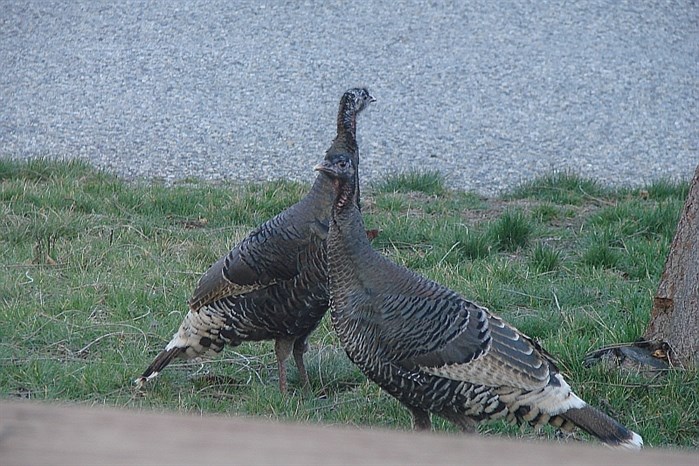
These wild turkeys were seen in a residential yard in Lake Country at the beginning of April.
Image Credit: SUBMITTED/ Facebook/ Rick Saint
April 03, 2024 - 6:59 AM
Wild turkeys are odd looking creatures with long legs and bald heads, often described as looking like dinosaurs or vultures. They roam in big flocks in the Kootenays and are becoming more prevalent in the Okanagan.
A conservation coordinator with the BC Wildlife Federation said populations of the big birds are growing in both areas and are expected to expand their range.
“They’re expanding as animals tend to do and will continue to spread north in the Kootenays,” Steve Hamilton said. “Hunters are helping to control their numbers to an extent, and they are heavily predated on by many other animals. I don’t see the populations exploding yet.”
The birds have been a growing problem in the Kootenays for several decades with residents reporting the birds are a nuisance.
“They’re 20-pound birds in big flocks, they can take apart a garden and flowerbeds pretty easily,” he said. “When I was (in Castlegar) they were everywhere on the highway and roads and up in trees it was crazy. They roost in trees at night because they’re big and scared of their own shadow.”
Recently, Lake Country resident and avid backcountry explorer, Jordan Paskevich, saw a flock of them on a local mountain range at roughly the same time another local resident posted on social media about a flock of birds roaming around his property.
“I’ve been travelling the BC backcountry for over 25 years and I’ve never seen wild turkeys in the Okanagan before now which tells me they're making a presence here,” he said.
“The hunting regulations are very strict for turkeys so I imagine their population will continue to grow as long as predators don’t get them all.”
READ MORE: TRENDING NOW: Cow enjoys sliding down hill
A native species from the United States, the birds were introduced to the Kootenays over 100 years ago as game for hunting, and were introduced in Lake Country for the same reason roughly two decades ago.
The wild turkeys are not invasive or a threat to native flora and fauna or the health of domestic poultry, and Hamilton said the birds coexist easily with other wildlife and pets. They are a food source for other wildlife and humans who are looking to pursue organic meat.
“They’re phenomenal for eating,” he said. “I’ve tried hunting them before but they’re cagey, they’re really intelligent when it comes to self preservation instincts. They see you get close and do a turn and burn.”
READ MORE: iN VIDEO: How wildfires and drought are impacting salmon in southern BC Interior
Hunters in the province are allowed to bag one wild turkey in the spring and one in the fall. Open season in the spring runs from April 15 to May 15, but two weeks ago the province invited the public to comment on a proposal to extend the closing date to May 25 and the decision is still pending.
“Wild turkey populations have increased in abundance and expanded across the Kootenay region over the past three decades,” the proposal reads. “Turkeys also inhabit rural properties and communities where they come in conflict with landowners. An extension in the spring hunting season is proposed to provide additional hunting opportunity and help manage conflict turkeys on private land.”
READ MORE: Penticton mourns iconic and friendly goose
The wild turkey is native to North America dating back millions of years. They have been reintroduced and introduced into almost every ecosystem.
“I’ve never heard of anyone complaining about turkeys down south of the border where they have a large presence," Paskevich said. "I’m very happy to see them in the Okanagan. I think they will be very positive for the area.”
To contact a reporter for this story, email Shannon Ainslie or call 250-819-6089 or email the editor. You can also submit photos, videos or news tips to the newsroom and be entered to win a monthly prize draw.
We welcome your comments and opinions on our stories but play nice. We won't censor or delete comments unless they contain off-topic statements or links, unnecessary vulgarity, false facts, spam or obviously fake profiles. If you have any concerns about what you see in comments, email the editor in the link above. SUBSCRIBE to our awesome newsletter here.
News from © iNFOnews, 2024